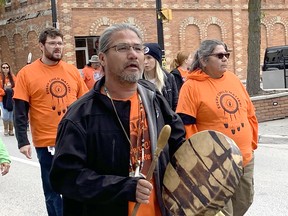From group to biodiversity, city gardens produce extra than simply produce

For David Walker, getting into his group backyard in East Vancouver is an escape from the troubles of day-to-day life.
He is been gardening at Cottonwood Neighborhood Gardens for 10 years.
“I fell in love with the place as quickly as I walked in,” he stated.
“I can shut out numerous the cares and strife of the remainder of the world, at the least for a couple of hours of the day.”
Walker is without doubt one of the many passionate gardeners in Vancouver who make the most of group area to chill out, develop meals and join with others — a few of the myriad advantages of gardening in city areas.
Tammara Soma, an assistant professor with the college of useful resource and environmental administration and analysis director with the meals methods labs at Simon Fraser College, says group gardens are essential for a lot of causes.
For instance, she stated, the gardens enhance biodiversity as new vegetation are added and thru pollination; they construct group relationships; and so they enhance meals safety for many who have entry to them and time to have a tendency them.
WATCH | Vancouver’s group gardens and ‘guerilla gardeners’:
City gardens are available in many types and supply myriad advantages to their surrounding communities.
In addition they take underutilized or derelict areas and switch them into one thing helpful. The Cottonwood Neighborhood Gardens, for instance, had been constructed on a former dump website.
The Metropolis of Vancouver estimates there are greater than 110 city rising areas in parks, college yards and on personal property all through town, a lot of which have wait lists for membership.
Soma says curiosity in group gardening grew through the COVID-19 pandemic.
“Folks had been searching for a method to spend time through the lockdowns, and likewise curiosity in gardening grew due to the grocery store disruptions, [such as] meals hoarding, lengthy strains at supermarkets,” she stated.
“Gardening was a means to make sure a semblance of meals system resiliency.”
On The Coast13:17A Little Filth By no means Damage: Cottonwood Gardens
CBC’s Melody Jacobson visits considered one of Vancouver’s oldest group gardens to study the way it obtained began and the way it continues to flourish.
City gardening is available in many types past the everyday small plots of separated planting areas.
For instance, Metropolis Beet Farm house owners Duncan Chambers and Liana Glass develop fruit, greens and flowers in residential yards all through Vancouver, that are then given to residents who purchase annual shares of the harvest.
They at present serve 87 members and provide additional produce to group help group Little Mountain Neighbourhood Home for his or her meals HUB packages.
Duncan stated he, Glass and two different staff are harvesting sufficient meals for 250 individuals from June to October.
“If we had many extra small farms like this, you possibly can simply multiply these numbers,” Duncan stated.
Carol Schoen stated permitting Metropolis Beet Farm to make use of her yard — considered one of 13 it farms throughout town — is “a wonderful, fantastic giving alternative as a house owner.”

“To have the ability to see life — meals, extra importantly — rising in my entrance yard brings a lot pleasure to me. And in addition it brings a dialog round when individuals stroll by about how we use our entrance yard,” she stated.
On The Coast8:46A Little Filth By no means Damage: Metropolis Beet Farms
Duncan Chambers and Liana Glass personal Metropolis Beet Farms, which grows crops on individuals’s entrance and backyards in Vancouver.
Soma agrees that city gardens are greater than a spot to develop meals.
“They’re additionally a method to form of help inter-generational information between the older Indigenous elders and information keepers and seniors, and the younger individuals,” she stated.
‘Decolonizing our mindsets’
Leona Brown, am Indigenous cultural facilitator and member of the Gitxsan and Nisga’a nations, has helped facilitate the event of Indigenous Meals Forests, which develop culturally vital meals and drugs within the Metro Vancouver area, together with one in East Vancouver that was began this summer time.
She stated these forests give city Indigenous individuals an opportunity to style and study vegetation which are vital inside their tradition, similar to salmonberries, huckleberries, tobacco, nettle and fireweed.
On The Coast8:52A Little Filth By no means Damage: Decolonizing Gardening
Leona Brown, an unbiased Indigenous cultural facilitator from the Gitxsan and Nisga’a nations and Métis edcautor Lori Snyder communicate with CBC’s On the Coast about what it means to decolonize gardening. Editor’s word: Following the interview, the Burrardview Neighborhood Affiliation stated they don’t condone the remarks made by somebody purporting to be a member at a Parks Board assembly. The affiliation says he holds no official position within the BCA and he was not licensed to talk on behalf of the group.
“It is decolonizing our mindsets to come back again to the medicines that we lived with for millennia earlier than colonization occurred,” Brown stated.
Educator Lori Snyder, who’s Métis, works with kids to show them concerning the significance of not solely rising meals and drugs, but additionally connecting with the land.
“They have been informed the filth is, you recognize, soiled,” she stated. “It is not filth — it is soil, it is a dwelling organism.”

Schooling can also be essential on the Ocean Park Neighborhood Orchard in Surrey, B.C.
“We attempt to do an training program that is not too boring for teenagers, however form of will get them to consider how this touches their lives,” stated founder Linda Stanley Wilson, a retired college professor.

The backyard is completely different from others in that the volunteers taking good care of the orchard do not take dwelling the fruits of their labour; as an alternative, it is donated to these in want.
“It is simply coming collectively and other people with the ability to give you concepts, work collectively towards a typical objective, and we do not have a set agenda,” she stated.
“Neighborhood actually form of expands relying on the those that present up. And we simply attempt to preserve encouraging and facilitating that.”
On The Coast7:32A Little Filth By no means Damage: Ocean Park Neighborhood Orchard
CBC story producer Melody Jacobson talked with Linda Stanley Wilson, one of many founders of Ocean Park Neighborhood Orchard.




